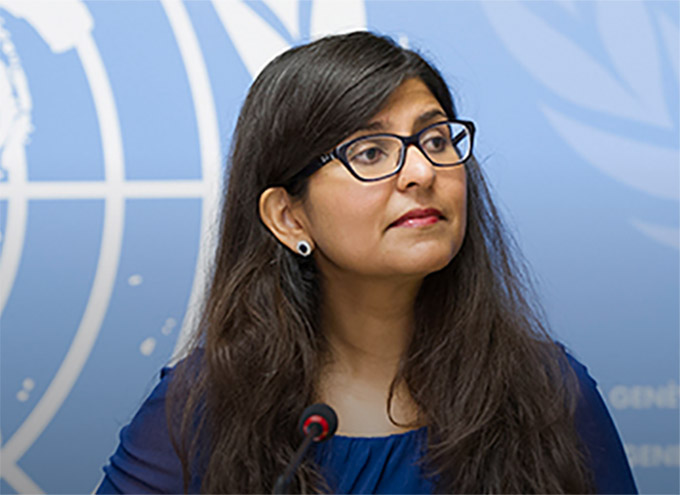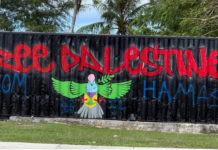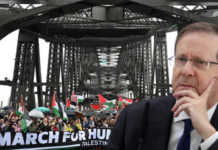
Pacific Media Watch Newsdesk
West Papuan rights to freedom of speech and peaceful assembly have been defended by the Office of the UN High Commissioner for Human Rights (OHCHR) in a response to the mass arrests of Papuan protesters during flag raising ceremonies earlier this month.
“These are indigenous people at the end of the day,” says spokesperson Ravina Shamdasani.
“So they are trying to defend their rights to be able to pray and to be able to retain their culture, their links to their land, but also the Papua region of Indonesia has not benefitted from all the economic development that the rest of the country has had.
LISTEN HERE: The full interview with OHCHR’s Ravina Shamdasani
“The rates of malnutrition are quite high.”
Shamdasani said in a radio interview with UN News that while President Joko “Jokowi” Widodo had been initiating development projects, “the problem here is that the people haven’t really been consulted.
“There haven’t been meaningful consultations [with] the people who are actually affected by this.”
In the interview, Shamdasani put into context the recent arrests of nearly 600 citizens who were detained for participating in West Papua’s national day, December 1, a global event for commemorating the first raising the Morning Star flag – banned by Indonesian authorities.
She also answered questions about development, armed conflict, and trying to gain access to the region.
Behind the West Papuan protests
The UN interview transcript:
[UN NEWS] The mass arrest of demonstrators in Indonesia who were attempting to mark a national day for indigenous people in the east of the archipelago, has been condemned by the UN human rights office, OHCHR.
More than 500 activists were detained at the start of the month – though they’ve since been released.
Spokesperson Ravina Shamdasani explained to UN News’ Daniel Johnson what’s behind these latest developments.
Ravina Shamdasani (RS): Last weekend there were peaceful protesters in the Papuan region of Indonesia who were celebrating what they call the “West Papua National Day,” and some 500 of them were arrested, detained. They were all subsequently released within 24 to 48 hours, but this does not take away from the fact that they should not have been arrested in the first place, and that this is not the first time this has happened.
It happens year after year and on several occasions during the year as well.
Daniel Johnson, UN News – Geneva (UN): What exactly are they protesting for apart from the fact that it’s their national day?
RS: Quite often these protests are protests for independence from Indonesia and of course we understand that the situation is complex. The Indonesian government is certainly not happy with these protests, but these people have their right to freedom of peaceful assembly and expression. So there was really no reason to arbitrarily detain them.
UN: As a minority what particular rights are they trying to defend and what are they trying to say is being threatened?
RS: Well, these are indigenous people at the end of the day. So they are trying to defend their rights to be able to pray and to be able to retain their culture, their links to their land, but also the Papua region of Indonesia has not benefited from all the economic development that the rest of the country has had. The rates of malnutrition are quite high. Now the current president of Indonesia has been initiating development projects. The problem here is that the people haven’t really been consulted. There haven’t been meaningful consultations of the people who are actually affected by this.
UN: Why is that? What structures are there in Papua, in Indonesia, to do this or not?
RS:The president has his analysis that the problem is one of economic development, um so he is trying to tackle that. But what we have emphasised, and what our previous High Commissioner during a visit to Jakarta in February of this year emphasised, was that development can of course bring with it access to many fundamental goods and services that can vastly improve people’s well beings, but if they cannot voice their concerns, and if they can’t participate in these decisions, the resulting development may not really increase their welfare, because it doesn’t really address the problems that they have.
UN: Ok, and what is your presence on the ground in this part of Indonesia given that it’s a huge country archipelago?
RS: We do not have a presence in Indonesia but we have a regional office in Bangkok that covers Southeast Asia – So we are, you know, in close contact with human rights defenders, civil society, government officials as well.
We have actually been seeking access to this region for quite awhile now. In February the High Commissioner was promised access, and we are still in discussions with the government of Indonesia to make that happen.
UN: This issue is not one that I’ve seen very often having been here what four years now. What’s your hope for the follow up and how many other similar cases are there that go really beneath the radar of international mainstream media?
RS: Too many international mainstream media tend to focus on the big conflicts. However there are many places like Papua, which are quite small, which have historic kind of long standing structural issues and unfortunately may not come up to the radar until there is an outbreak of conflict
What our office tries to do is try to ring the alarm bells early on, before the situation rises to the level of an armed conflict.
UN: You’re not suggesting it’s at that level now? Of course.
RS: No we’re not suggesting it’s at that level now, but there are many grievances, and we’ve seen this in many parts of the world where grievances are unaddressed, or there’s a suppression of dissent. And then people take the law into their own hands because they feel they are not being heard.
This is actually happening at a very low level in Papua at the moment. There are armed groups that are operating. In fact, just this week I believe a number of people were killed. These were government contractors who were there doing a development project.
They were killed by armed groups which of course is unacceptable, but you have to understand the root causes and you have to address the root causes.
UN Office of Human Rights defends Papuans right to freedom of peaceful assembly and expression









































“Chapter VII of the United Nations Charter sets out the UN Security Council’s powers to maintain peace. It allows the Council to “determine the existence of any threat to the peace, breach of the peace, or act of aggression” and to take military and nonmilitary action to “restore international peace and security”
Kobe Oser is demanding ACTION from UN Under Secretary General Jeffrey D. Feltman in this link, 49 minut 30 sec.: https://www.youtube.com/watch?v=Ofnfz6HlIm4
In accordance with the PAX AMERICANA DOCTRINE & the International 1962 New York Agreement, the US can prevent genocide & withdraw its carte blanche to the barbaric RI Generals regime & put a stop to the devastation of West Papua Melanesia, and the impunity for those responsible.
This by adressing the UN C-24 & directing the ANZUS Security pact to secure the with the 1947 Canberra Agreement acknowledged Melanesian waters.
Please consider the break-away of West Papua/ Melanesia from Indonesia through Self determination as simple mathematics by executing the following formula:
1. The original 1945 Proklamasi Sukarno-Hatta was from “A till A” (Atjeh till Ambon), did NOT include West Papua. Because on that same day in 1945, according to the 1944 Atlantic Charter, West Papua tribal leaders led by Marcus Wonggor Kaisiëpo, issued a statement in Kota Nica to RADEN Colonel AbdulKadir Widojojoatmodjo of the NICA (Netherlands-Indies Civil Administration) which was governing West Papua.
The message was simple: “West Papua Melanesia would determine its own future and therefore will never be a part of a new Indonesian state”. As from that moment any historical claim of Indonesia on West Papua is not funded as this 1945 statement widely expressed the Will of the West Papua people.
Therefore how NKRI manages its Bhinneka Tunggal Ika or executes its Pancasilah is OF NO INTEREST WHATSHOWEVER to the people of West Papua Melanesia as Papuans MUST BE FREED FROM NKRI-TYRANNY.
On this basis the 1947 Canberra Agreement between Pacific States and western states (U.S., Netherlands, France, Ireland Australia, N-Zealand) was signed, recognizing West Papua as a Nation and recognizing it’s Melanesian territorial borders and establishing the South Pacific Commission. As from that moment West Papua leaders attended the plenary sessions of the SPC.
So Indonesia is living in denyal by considering West Papua as an internal question and within it’s own territorial integrity, as from 1963 Indonesia is ILLEGALLY OCCUPYING the since 1947 undisputed territorial Melanesian borders of West Papua Melanesia.
Underlining this illegal basis, Indonesia prooved its democratic INCAPACITY by renaming West Papua several times, divide and conquer- politics, and keeping the world opinion happy by demonstrating democracy by issueing autonomy legislation in 2000, which still has to be implemented. And on top of this, issueing new legislation in 2006, dividing provinces, undermining its own 2001 autonomy laws.
Indonesia’s failing attempts for democracy is illustrated with the banning of showing the West Papua Morningstar flag in public, which’s freely expression was adopted in 2001 by the parlement under president Abdulrahman Wahid.
2. The revenues of West Papua’s natural resources and wealth (gold, copper nickel, oil& gas, wood) are feeding the economy of the FAILED democratic state Indonesia.
West Papua Melanesia is Indonesia’s guarantee for economic survival and to avoid bankruptcy of the FAILED democratic Indonesian state.
See link: https://fcx.com/operations/indonesia
3. According to the US Pax Americana doctrine, the Kennedy Administration HANDED OVER West Papua in 1962 to Indonesia. Whenever USA’s interest & profits are endangered, the USA will strike Indonesia for its benefit (see cases of Kuwait, Afghanistan, Iraq).
So in despite of the brutal and corrupt Indonesian Generals regime and its atrocities, the US will take back West Papua by re-implementing the 1962 New York Agreement to its merites, by using the United Nations Special Committee on Decolonization (C-24), inorder to maintain the Pax Americana Worldpeace.
We are confident, that the present generation of representatives active at the United Nations Committee C-24, will follow up on this and set straight the record. Immediate decolonization is the issue at hand here.
It is a Long Way to Go Never Give Up / Persevero !
Setia Djudjur Mesra / Trouw, Eerlijk, Innig Verbonden.
Link informasi: http://kobe-oser.nl/70th-anniversary-the-south-pacific-com…/
Comments are closed.